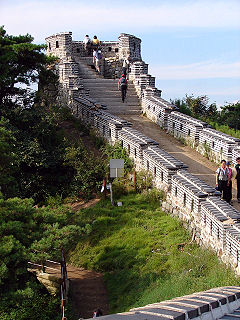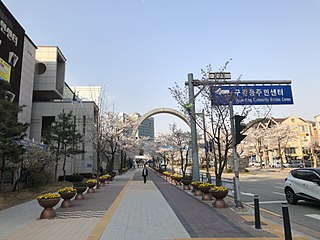Other stadia in Gwangju, Gyeonggi-do, South Korea
Gwangju City Public Stadium, Silchon Public Stadium and Toichon Public Stadium are also located in Gwangju, Gyeonggi-do, South Korea.
Opo Public Stadium is a small stadium in Gwangju, Gyeonggi-do, South Korea. It is currently used mostly for amateur football matches and other activities. The stadium has a capacity of only a few hundred people.
Gwangju City Public Stadium, Silchon Public Stadium and Toichon Public Stadium are also located in Gwangju, Gyeonggi-do, South Korea.
Gyeonggi Province is the most populous province in South Korea. Its name, Gyeonggi, means "the area surrounding the capital". Thus Gyeonggi-do can be translated as "province surrounding Seoul". Seoul, the nation's largest city and capital, is in the heart of the province but has been separately administered as a provincial-level special city since 1946. Incheon, the nation's third-largest city, is on the coast of the province and has been similarly administered as a provincial-level metropolitan city since 1981. The three jurisdictions are collectively referred to as Sudogwon and cover 11,730 km2 (4,530 sq mi), with a combined population of 25.5 million—amounting to over half of the entire population of South Korea.

Namhan Mountain is a 460 m peak in Gyeonggi-do province, South Korea. It lies on the border between southern Seoul and the city of Gwangju.

Gwangju is a city in Gyeonggi Province, South Korea, a suburb southeast of Seoul. The city is not to be confused with the much larger Gwangju Metropolitan City, former capital of South Jeolla Province, South Korea.

Guri is a city in Gyeonggi Province, South Korea. It is located immediately to the east of Seoul, in the heart of the Capital Metropolitan Area.
Hanam is a city in Gyeonggi Province, South Korea. Formerly a part of Gwangju County, it was designated a city in 1989. The ancient Baekje capital of Hanam Wiryeseong may have been located there.

Icheon is a city in Gyeonggi Province, South Korea.

Pocheon (Korean pronunciation: [pʰo.tsʰʌn]) is an inland city in the far northeastern region of Gyeonggi province in South Korea. It covers 826.48 km (513.55 mi)2 with a population of 160,176 people, according to the 2008 census. Pocheon lies between Seoul and the mountainous northwestern areas of Gangwon province. The city borders Yeoncheon county, with the cities of Dongducheon and Yangju to the west, along with Uijeongbu, and Namyangju of Gyeonggi province to the south. It also borders Hwacheon county of Gangwon province on its eastern border and Cheorwon is to the north. Alongside the adjoining Gapyeong, Pocheon consists of the highest mountainous areas in Gyeonggi province. The current city of Pocheon was created after Pocheon-hyeon and Yeongpyeong counties were merged. The north part of the city used to be part of Yeongpyeong county while the south used to be part of Pocheon-hyeon.

Seongnam is the second largest city in South Korea's Gyeonggi Province after Suwon and the 10th largest city in the country. Its population is approximately one million. Seongnam is a satellite city of Seoul. It is largely a residential city located immediately southeast of Seoul and belongs to the Seoul National Capital Area.

The Diocese of Suwon is a particular church of the Latin Rite of the Catholic Church. The seat of the Bishop of Suwon is at Jeongjadong Cathedral in Suwon, Gyeonggi-do, South Korea.

Kangnam University is a private university in Yongin, South Korea.
Gwangju City Public Stadium is a multi-purpose stadium in Gwangju, Gyeonggi-do, South Korea. It has currently come to be a popular attraction for Gwangju residents, who attend daily exercise sessions, as well as amateur football games and other activities. The stadium has a capacity of about 4,000 people.
Shilchon Public Stadium plans to be built as a multi-purpose stadium in Gwangju, Gyeonggi-do, South Korea. It will be under construction from 2008 year and will be used mostly for amateur football matches and other activities. It will open a few years later.
Toichon Public Stadium is a multi-purpose stadium in Gwangju, Gyeonggi-do, South Korea. It is currently used mostly for amateur football matches and other activities.

Suwon Bus Terminal is the main intercity and express bus station serving Suwon, a city in South Korea's north-west province of Gyeonggi-do. The station is located in Gwonseon-gu, 2.6km south-east of Suwon Station. Standing beside a branch of E-Mart, it is not to be confused with West Suwon Bus Terminal, which is located adjacent to a different branch of the same store.

Samseong-Dong is an affluent neighborhood or ward of Gangnam-gu in Seoul, South Korea.
Yongmunsan is a mountain in the county of Yangpyeong, Gyeonggi-do in South Korea. It has an elevation of 1,157.2 m (3,797 ft).

LetsRun Park Seoul, also known a Seoul Race Park or Seoul Racecourse Park is a 40,000 capacity Korean thoroughbred racetrack in Gwacheon, Gyeonggi-do, South Korea. It is host to many of Korea's most valuable thoroughbred horse races including the Korean Derby and Grand Prix. LetsRun Park Seoul is located next to Seoul Racecourse Park Station on Line 4 of the Seoul Metropolitan Subway. It is operated by the Korea Racing Authority (KRA).
Student Human Rights Ordinance is an ordinance in operation in some cities and provinces in South Korea. It first began in Gyeonggi-do Province (2010) and expanded to Gwangju (2011), Seoul (2012), and the Jeollabuk-do Province (2013). The primary objective of the ordinance is to extend human rights protection for students and youth in South Korea.